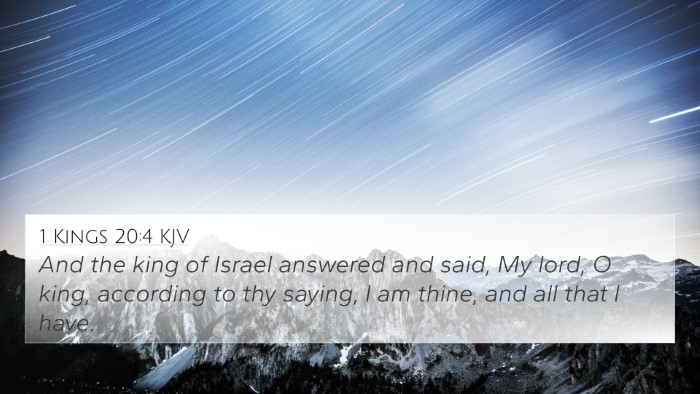Understanding 1 Kings 2:38
Verse: 1 Kings 2:38 - "And Shimei said unto the king, The saying is good: As my lord the king hath said, so will thy servant do. And Shimei dwelt in Jerusalem many days."
Contextual Overview
The verse occurs in the concluding chapters of King David's reign, illustrating the power dynamics within the royal court, particularly concerning Shimei, who had shown animosity toward David. David's instructions to Shimei are pivotal in understanding loyalty and retribution in biblical narratives.
Commentary Insights
Matthew Henry: Henry explains that Shimei's words, while seemingly submissive, may mask his true intentions. He highlights the theme of obedience in Shimei's response to the king, noting how this obedience is put to the test later.
Albert Barnes: Barnes emphasizes the importance of Shimei's extended residence in Jerusalem as a symbol of both his loyalty and the ongoing political tension. He references the broader implications of loyalty in a leadership context and how Shimei's fate is tied to his actions.
Adam Clarke: Clarke focuses on the covenant discerned in Shimei's commitment to remain in Jerusalem. He draws parallels to previous biblical figures who faced similar ultimatums and reflects on the themes of mercy and judgment embedded in Shimei's narrative.
Thematic Analysis
- Obedience and Loyalty: Shimei's promise to the king illustrates not just his submission but raises questions about the authenticity of such loyalty.
- Consequences of Actions: The unfolding events following this promise establish a clear link between one's words and deeds.
- Political Intrigue: The dynamics in the court during David's reign highlight the precarious nature of loyalty within leadership.
Related Cross-References
- 2 Samuel 16:5-13: The initial conflict between David and Shimei, revealing the backdrop of their relationship.
- 1 Kings 2:36-38: David's directions to Shimei set the stage for the promise made in this verse.
- 2 Samuel 19:18-23: The reconciliation, when David returns to Jerusalem, sheds light on Shimei’s character.
- Proverbs 17:20: Speaking to the heart issues linked to loyalty and trustfulness.
- James 1:22: Highlights the need for not just hearing but doing what one commits to.
- Matthew 5:37: Emphasizes the integrity of one's vows and the need for honest speech.
- Galatians 6:7: The spiritual principle that one will reap what they sow, relating to Shimei's later actions.
Conclusion
The verse encapsulates a pivotal moment within the biblical narrative, as Shimei’s words foreshadow significant developments regarding loyalty and consequences in a leader's realm. The insights from prominent commentaries collectively underscore the deeper implications of obedience, trust, and political maneuvering present in this historical context.
Further Reflections on Cross-Referencing Themes
To enrich one’s understanding of scripture, cross-referencing becomes an invaluable tool. Here, we explore how 1 Kings 2:38 interacts with other biblical verses, providing insights for deeper exploration and study.
This verse helps illustrate profound themes central to biblical teachings, such as the nature of true obedience, the risks of power, and the long-lasting repercussions of one’s decisions. Utilizing effective tools for Bible cross-referencing enables scholars and laypersons alike to navigate these themes and draw connections across biblical texts.




